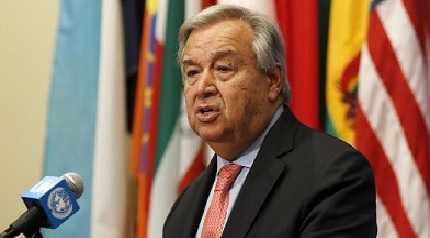
JAKARTA, Indonesia (AP) — The United Nations chief renewed an urgent call to the international community Thursday to seek a unified strategy to end the worsening crisis in Myanmar.
Secretary-General António Guterres said declining financial aid should be boosted to previous levels to enable the world body to respond to an “enormous tragedy.” He said the situation in Myanmar has further deteriorated since he met with ASEAN leaders in a 2022 summit, and again called on the crisis-wracked country’s military-installed government to immediately free all political prisoners and “open the door to a return to democratic rule.”
Myanmar’s army seized power on Feb. 1, 2021, from the elected government of Aung San Suu Kyi, arresting her and top members of her governing National League for Democracy party, which had won a landslide victory for a new term in a November 2020 general election.
Security forces suppressed widespread opposition to the military takeover with lethal force, killing thousands of civilians and arresting thousands of others who engaged in nonviolent protests. The savage crackdown triggered armed resistance in much of the impoverished country.
Guterres made the case for an international response in a news conference Thursday before joining the Association of Southeast Asian Nations leaders’ summit meetings in the Indonesian capital Jakarta. Guterres also renewed his alarm over other issues being aggravated by nations butting heads. He warned that “there is a real risk of fragmentation — of a great fracture in world economic and financial systems with diverging strategies on technology and artificial intelligence and conflicting security frameworks.”
“Our world is stretched to the breaking point by a cascade of crises: from the worsening climate emergency and escalating wars and conflicts, to growing poverty, widening inequalities and rising geopolitical tensions,” Guterres said.
In August 2017, longstanding discrimination against Rohingya Muslims in Buddhist-majority Myanmar, including denial of citizenship and other rights, boiled over when Myanmar’s military launched what it called a clearance campaign in northern Rakhine state in response to attacks on police and border guards by a Rohingya militant group.
More than 700,000 Rohingya fled to Bangladesh, where they remain in camps, as Myanmar troops allegedly committed mass rapes and killings and burned thousands of homes.
The International Court of Justice, the U.N.’s top court, ordered Myanmar in January 2020 to do all it could to prevent genocide against the Rohingya.
“I remain deeply concerned about the worsening political, humanitarian, and human rights situation in Myanmar, including Rakhine State and the plight of the massive number of refugees living in desperate conditions,” he said.
The U.N. chief expressed support to a five-point peace plan crafted by ASEAN leaders in 2021. It calls for an immediate end to violence in Myanmar and the start of dialogue among contending parties, including the ruling generals and Suu Kyi’s camp.
ASEAN leaders, however, acknowledged in a joint statement that their strategy has failed to make any progress in Myanmar.
Despite such failure, the 10-nation bloc’s leaders decided to stick with the plan and continue to prohibit Myanmar’s generals and their appointed officials from attending ASEAN’s high-level summits.
U.S. Vice President Kamala Harris, who flew to Jakarta to join the summit talks in lieu of President Joe Biden, told the ASEAN leaders Wednesday that Washington supports their peace plan.
“We have a shared commitment to international rules and norms and to our partnership on pressing national and regional issues such as the crisis in Myanmar,” Harris said.
“The United States will continue to press the regime to end the horrific violence, to release all those unjustly detained and to reestablish Myanmar’s inclusive democracy,” Harris said.




